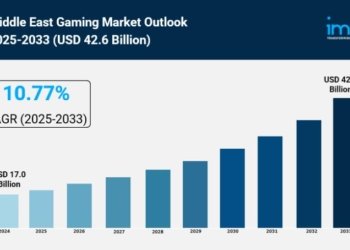How Is the Artificial Intelligence (AI) In Travel Market Projected to Grow, and What Is Its Market Size?
The market size of artificial intelligence (AI) in the travel industry has witnessed remarkable growth over the past few years. The market, which is expected to rise from $123.72 billion in 2024, is projected to reach a worth of $165.93 billion in 2025, at a compound annual growth rate (CAGR) of 34.1%. The historical growth of this market has been spurred by factors like the surge in digital transformation, growing demand for tailor-made travel experiences, heightened need for increased operational efficiency, emphasis on providing security and safety, increase in usage of wearable and mobile technology, and the mounting pressure for automation in customer service.
The AI in travel industry’s market size is projected to experience a remarkable surge in the coming years, with an estimation of reaching $531.95 billion in 2029 at a 33.8% compound annual growth rate (CAGR). This anticipated growth during the forecast period can be ascribed to various factors such as a rise in the demand for tailored travel experiences, increased reliance on contactless technologies, growing emphasis on improved security and safety guidelines, expansion of intelligent infrastructure at travel nodes, and an escalating trend of AI-based analytics for optimizing operations. The forecast period is also expected to see significant trends like the use of AI for customized customer interaction, adoption of self-driving vehicles and AI-controlled robots, utilization of AI-enabled chat helpers and virtual support, deployment of AI-infused predictive analytics, and advancements in touch-free technologies.
What Are the Key Drivers Behind the Growth of the Artificial Intelligence (AI) In Travel Market?
The growth of the artificial intelligence (AI) in travel market is anticipated to be fueled by the escalating worldwide tourism. Global tourism, which refers to the international movement of individuals for leisure, business among other purposes, cultivates economic progression, global relations, and cross-cultural exchange. The global tourism boom is due to factors such as increased disposable incomes, easier international travel, heightened interest in discovering new destinations, and advancements in travel technologies. AI in travel revolutionizes tourism by offering custom recommendations, automating bookings and enhancing customer service, thereby promoting an overall better travel experience and operational efficiency. For example, in 2024, the World Travel and Tourism Council, a travel company based in the UK, reported that in 2023, travel and tourism contributed to 9.1% of the global GDP, exhibiting a 23.2% increase compared to 2022. Therefore, the ballooning global tourism sector triggers the growth of the artificial intelligence (AI) in travel market.
Get Your Free Sample Now – Explore Exclusive Market Insights:
https://www.thebusinessresearchcompany.com/sample.aspx?id=19315&type=smp
Who Are the Major Industry Players Fueling Artificial Intelligence (AI) In Travel Market Expansion?
Major companies operating in the artificial intelligence (AI) in travel market are International Business Machines Corporation, Expedia Group Inc., Priceline.com, Booking.com B.V., Airbnb Inc., Sabre Corporation, TripAdvisor Inc., Agoda Company Pte. Ltd., SAP Concur, Travelport Worldwide Ltd., Hotelbeds Group, Skyscanner Ltd., Trivago N.V., MakeMyTrip Limited, Fareportal, Kayak Software Corporation, Despegar.com Inc., Cendyn Group LLC, Hopper, Cleartrip Private Limited, Sojern Inc., OTA Insight Ltd., Adara Inc., Viator Inc., Duetto
Which Key Developments Are Influencing the Artificial Intelligence (AI) In Travel Market?
Leading firms in the sector of artificial intelligence (AI) in travel are concentrating on technological advancements like the incorporation of AI in custom travel to improve client experiences through the provision of personalized suggestions, the optimization of travel plans, and real-time support. AI in personalized travel uses technology to assess user data and preferences, offering bespoke destination, accommodation, and activity suggestions based on individual requirements and previous habits. For example, in May 2024, Expedia Group Inc., an American travel technology firm, debuted an AI-enabled assistant named Romie. It serves as a personal travel agent for the user, assisting with planning, booking, and dealing with last-minute alterations to the travel plans. As time progresses, Romie learns the user’s preferences, providing bespoke suggestions and capabilities such as group chat planning, intelligent searching, and itinerary formulation.
How Is the Segmentation of the Artificial Intelligence (AI) In Travel Market Defined?
The artificial intelligence (AI) in travel market covered in this report is segmented –
1) By Component: Software, Services
2) By Deployment mode: On-Premises, Cloud-Based
3) By Application: Customer Service, Booking And Reservations, Travel Planning And Personalization, marketing And Advertising, Operations Management, Security And Fraud Detection
Subsegments:
1) By Software: AI-powered Travel Booking Platforms, Chatbots and Virtual Assistants, Personalization and Recommendation Engines, Revenue Management Software, Customer Relationship Management (CRM) Tools
2) By Services: Consulting Services, Implementation and Integration Services, Data Analytics and Insights Services, Training and Support Services, Digital marketing Services
Pre-Book Your Report Now For A Swift Delivery:
https://www.thebusinessresearchcompany.com/report/artificial-intelligence-ai-in-travel-global-market-report
What Is the Leading Region in the Artificial Intelligence (AI) In Travel Market?
North America was the largest region in the artificial intelligence (AI) in travel market in 2024. The regions covered in the artificial intelligence (AI) in travel market report are Asia-Pacific, Western Europe, Eastern Europe, North America, South America, Middle East, Africa.
What Is Covered In The Artificial Intelligence (AI) In Travel Global Market Report?
– Market Size Analysis: Analyze the Artificial Intelligence (AI) In Travel Market size by key regions, countries, product types, and applications.
– Market Segmentation Analysis: Identify various subsegments within the Artificial Intelligence (AI) In Travel Market for effective categorization.
– Key Player Focus: Focus on key players to define their market value, share, and competitive landscape.
– Growth Trends Analysis: Examine individual growth trends and prospects in the Market.
– Market Contribution: Evaluate contributions of different segments to the overall Artificial Intelligence (AI) In Travel Market growth.
– Growth Drivers: Detail key factors influencing market growth, including opportunities and drivers.
– Industry Challenges: Analyze challenges and risks affecting the Artificial Intelligence (AI) In Travel Market.
– Competitive Developments: Analyze competitive developments, such as expansions, agreements, and new product launches in the market.
Unlock Exclusive Market Insights – Purchase Your Research Report Now!
https://www.thebusinessresearchcompany.com/purchaseoptions.aspx?id=19315
Connect with us on:
LinkedIn: https://in.linkedin.com/company/the-business-research-company,
Twitter: https://twitter.com/tbrc_info,
YouTube: https://www.youtube.com/channel/UC24_fI0rV8cR5DxlCpgmyFQ.
Contact Us
Europe: +44 207 1930 708,
Asia: +91 88972 63534,
Americas: +1 315 623 0293 or
Email: mailto:info@tbrc.info
Learn More About The Business Research Company
With over 15,000+ reports from 27 industries covering 60+ geographies, The Business Research Company has built a reputation for offering comprehensive, data-rich research and insights. Our flagship product, the Global Market Model delivers comprehensive and updated forecasts to support informed decision-making.
This release was published on openPR.















